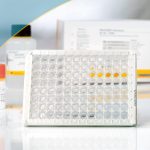The bacteria Clostridium difficile colonizes every human intestine, although it may be harmful for those with compromised immune systems. It is becoming increasingly prevalent in hospitals. What is the secret of its success?
Clostridium difficile is not always dangerous. It is a component of the human flora. Only in a situation like this may it become dangerous: A patient is in the hospital and has been prescribed antibiotics. In him, the quantity of “good” gut bacteria is drastically decreased, allowing Clostridium difficile to flourish rapidly. The patient’s colon becomes irritated, resulting in diarrhea that can be fatal. Clostridium difficile Awareness Month* strives to improve public awareness of the dangers.
One strain in particular is quite advanced
Clostridium difficile is “genetically specialized for survival in hospitals,” according to the Ärzteblatt, german magazine for physicians. This is especially true of one strain (Clade A).
Its advantage is that it grows more quickly in the intestines of antibiotic-treated people. Clade A metabolizes glucose more efficiently. The study’s authors emphasize that this should be factored into patients’ diets. Furthermore, Clade A produces more resistant spores than other C. difficile strains, according to the researchers.
Strategies against Clostridium difficile
Approximately 20% of individuals’ problems go away once they stop taking antibiotics. Antibiotics are required in 80 percent of cases. Isolation of sick people is also necessary. Spores are expelled in feces and contaminate surfaces. Furthermore, it can be found in the air. Heat, desiccation, and disinfectants have little effect on the spores. Toxic clostridia have been detected in one out of every seven emergency rooms, according to research.
What helps protect patients?
There are two fronts in the fight against Clostridium difficile. The first is prevention, and the second is knowing what to do if you become ill.
The microorganism is kept at bay through education and good hygiene. Patients and hospital personnel should be aware of transmission channels and maintain sufficient cleanliness (hand washing, cleaning shared toilets, etc.). Here are some preventative measures.
Diagnosis in 2 steps
When an infection is suspected, swift and reliable tests are required. R-Biopharm provides test kits for every environment and technique (rapid tests, ELISA, PCR).
The presence of the Clostridium difficile-specific enzyme glutamate dehydrogenase is one option (GDH). This approach is quick and sensitive, however it is not specific enough since non-difficile bacteria are discovered as well.
As a result, a two-step diagnostic method is advantageous: if the GDH test is positive, specific identification of toxins A and B follows. A Clostridium difficile infection can be ruled out with a high degree of probability if the GDH test is negative.
* The idea originated in the USA, where the numbers of infections and deaths are accurately recorded. The “US Centers for Disease Control and Prevention (CDC)” collects data and informs facilities about the risks.








